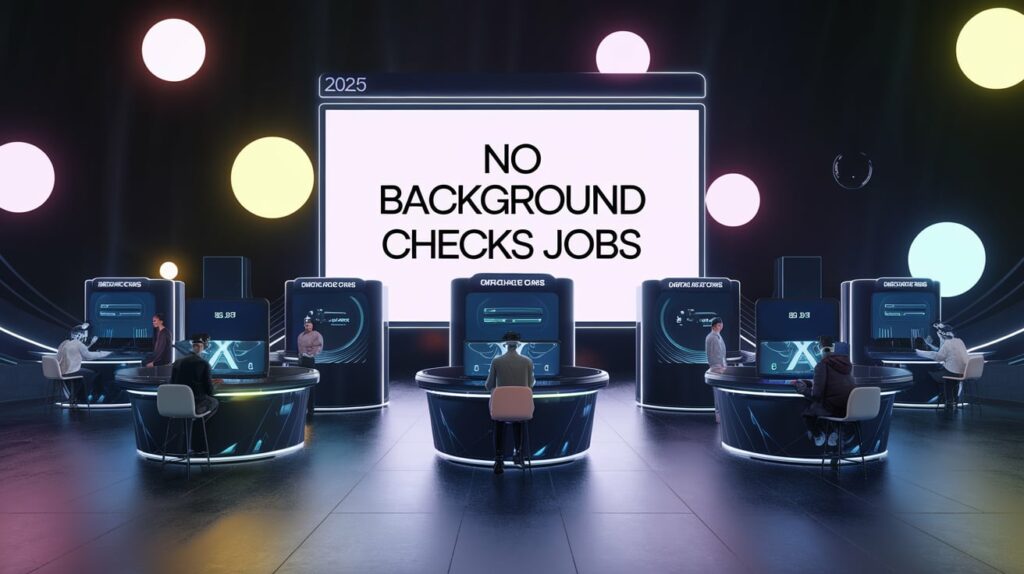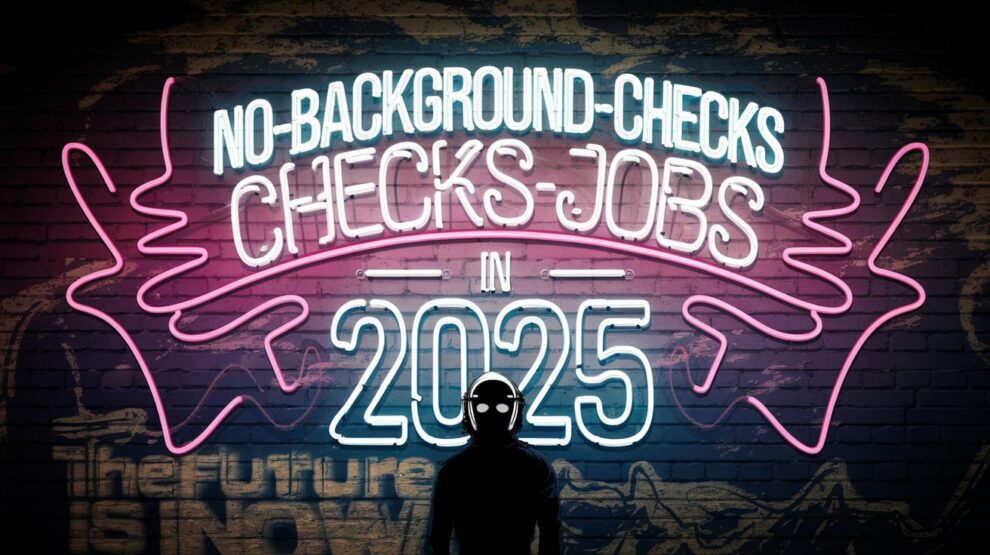Unlock Your Career in 2025: Discover High-Demand Jobs That Skip Background Checks and Offer a Fresh Start!
Table of Contents
In 2025, the job market is more accessible than ever for those seeking opportunities without the hurdle of background checks. Whether you have a criminal record, employment gaps, or simply need a job fast, no-background-check jobs provide a pathway to quick employment. These roles, spanning industries like food service, gig work, and manual labor, prioritize skills and availability over past history. This blog explores where to find these jobs, high-paying options, top industries, remote opportunities, and how to apply confidently while understanding the safety and legal aspects.
No Background Checks Jobs: Where to Find Work Without the Wait in 2025
No-background-check jobs are abundant in high-turnover sectors where speed is critical. Job boards like Indeed and Snagajob list thousands of entry-level roles with “immediate start” filters. Local businesses, such as restaurants or construction firms, often post openings on community boards or hire on the spot. Gig platforms like Upwork and TaskRabbit connect workers to quick jobs based on skills, not vetting. Networking at job fairs or through LinkedIn can uncover opportunities, while sites like 70millionjobs.com specialize in second-chance hiring for those with criminal records.
High-Paying No Background Check Jobs You Can Start Immediately
While many no-background-check jobs are entry-level, some offer competitive pay:
- Bartenders: Earn $15-$30/hour (plus tips, up to $50/hour in upscale venues) with minimal training.
- Construction Supervisors: With experience, supervisors earn $25-$40/hour, often without initial checks.
- Freelance Writers/Designers: Skilled freelancers on Upwork can charge $30-$60/hour for specialized projects.
- Delivery Drivers: Gig drivers for DoorDash or Uber Eats earn $18-$25/hour in busy markets, requiring only basic eligibility. Certifications (e.g., OSHA for construction, $25-$100) can boost access to higher-paying roles.
Top Industries Offering No Background Checks Jobs Today

Certain industries in 2025 are known for prioritizing rapid hiring over extensive background checks, driven by high turnover, labor shortages, or a focus on practical skills. These sectors offer accessible opportunities for job seekers who need quick employment or face barriers like criminal records or employment gaps. Below, we explore four key industries—food service, construction, retail/hospitality, and the gig economy—detailing why they skip background checks, the roles available, skills needed, salary expectations, and career potential.
Food Service
The food service industry, employing over 14.7 million workers in the U.S. (Bureau of Labor Statistics, 2023, with growth projected into 2025), is characterized by a turnover rate exceeding 70% annually. Restaurants, bars, cafes, and food trucks constantly need staff for roles like servers, cooks, bartenders, dishwashers, and hosts, making it a prime sector for no-background-check jobs.
Why No Background Checks?: High turnover and seasonal demand (e.g., holidays, summer) push employers to fill positions quickly. Background checks, costing $30-$100 per candidate and taking days to process, can delay hiring in an industry where immediate staffing is critical. Small, independent establishments or fast-paced chains often rely on interviews, trial shifts, or personal references to assess candidates, prioritizing work ethic and availability over past records.
Roles and Skills:
- Servers/Hosts: Require strong communication, customer service, and multitasking skills. Basic math for handling payments is helpful. No formal education is needed, though a high school diploma may be preferred.
- Cooks/Dishwashers: Need basic kitchen skills (e.g., following recipes, hygiene standards) and physical stamina. Training is often provided on the job.
- Bartenders: Knowledge of drink recipes or a bartending certification (e.g., TIPS, ~$40) is a plus but not always required.
- Many roles require no prior experience, though a positive attitude and reliability are key.
Potential Employers: Local diners, chain restaurants (e.g., Olive Garden, Chipotle), bars, food trucks, and catering services. Job boards like Indeed, Snagajob, or Poached list openings, often with “immediate hire” tags. Visiting restaurants during off-peak hours can lead to on-the-spot interviews.
Salary Expectations:
- Servers: $12-$20/hour (plus tips, potentially $25-$40/hour in busy venues).
- Cooks: $14-$18/hour.
- Bartenders: $15-$30/hour (plus tips, up to $50/hour in upscale bars).
- Dishwashers: $12-$16/hour.
- Wages vary by location, with urban areas offering higher pay due to demand and cost of living.
Growth Opportunities: Entry-level roles can lead to supervisory positions like shift manager or kitchen manager within 1-2 years, with salaries of $18-$25/hour. Bartenders may advance to bar management or open their own venues. Certifications like ServSafe Food Handler ($15-$150) enhance prospects for higher-paying roles.
Construction
The construction industry faces a persistent labor shortage, needing approximately 650,000 workers annually (Associated Builders and Contractors, 2024). Roles like general laborers, painters, drywall installers, and flaggers are accessible, particularly for small contractors or project-based work.
Why No Background Checks?: Tight project deadlines and labor shortages drive employers to prioritize skills and physical capability over background vetting. Background checks are costly and time-consuming, so many firms, especially smaller ones, rely on trial shifts, certifications (e.g., OSHA 10-hour, $25-$100), or references to evaluate candidates. The industry’s focus on immediate productivity makes it ideal for quick hires.
Roles and Skills:
- General Laborers: Handle tasks like carrying materials or site cleanup. Require physical fitness (lifting 50+ pounds) and basic safety knowledge.
- Painters/Drywall Installers: Need precision and familiarity with tools; training is often provided.
- Flaggers: Direct traffic at construction sites; require attentiveness and basic training (sometimes provided on-site).
- No formal education is needed, though OSHA certifications or trade skills boost employability.
Potential Employers: Local contractors, subcontractors, or large firms like Bechtel or Turner Construction. Union halls (e.g., Laborers’ International Union) and job boards like ConstructionJobs.com list openings. Inquiring at active construction sites can yield immediate opportunities.
Salary Expectations:
- General Laborers: $15-$22/hour.
- Painters/Drywall Installers: $18-$25/hour.
- Flaggers: $14-$20/hour.
- Unionized roles or urban markets offer higher wages, up to $30/hour for skilled positions.
Growth Opportunities: Laborers can advance to skilled trades (e.g., carpentry, welding) through apprenticeships (2-4 years, often paid). Certifications like OSHA 30 or trade licenses can lead to supervisory roles or self-employment, with earnings of $30-$50/hour.
Retail/Hospitality
Retail and hospitality employ millions in roles like cashiers, stockers, housekeepers, and front desk staff. These industries, with high seasonal and turnover demands, often hire quickly to maintain operations.
Why No Background Checks?: Small retail shops or hospitality businesses (e.g., motels, cleaning services) prioritize filling roles fast, especially during peak seasons like holidays. Background checks are often skipped to save time and costs, with employers relying on interviews or trial shifts to assess customer service skills and reliability.
Roles and Skills:
- Cashiers/Stockers: Need basic math, customer service, and organizational skills. No prior experience is required.
- Housekeepers: Require attention to detail and physical stamina for cleaning tasks.
- Front Desk Staff: Need communication skills and basic computer literacy.
- A high school diploma may be preferred but is rarely mandatory.
Potential Employers: Local retail shops, chain stores (e.g., Dollar General, Target), hotels, or cleaning services like Merry Maids. Job boards like RetailGigs.com or local community boards advertise openings.
Salary Expectations:
- Cashiers: $12-$18/hour.
- Housekeepers: $13-$18/hour.
- Front Desk Staff: $14-$20/hour.
- Wages are higher in high-cost-of-living areas or tourist-heavy regions.
Growth Opportunities: Entry-level workers can move to supervisory roles (e.g., store manager, housekeeping lead) within 1-3 years, earning $18-$25/hour. Customer service training or hospitality certifications (e.g., AHLEI courses, $50-$200) can lead to management positions.
Gig Economy
The gig economy, projected to encompass 50% of the U.S. workforce by 2027 (Upwork, 2024), includes freelance roles (e.g., writing, design) and delivery services (e.g., DoorDash). These jobs rely on skills or basic eligibility, not background checks.
Why No Background Checks?: Gig platforms prioritize portfolios, client reviews, or minimal checks (e.g., driver’s license for delivery). The decentralized nature of gig work means clients or platforms focus on results, making these roles accessible to diverse candidates.
Roles and Skills:
- Freelancers: Writers or designers need portfolios and proficiency in tools like Grammarly or Adobe Creative Suite.
- Delivery Drivers: Require a valid driver’s license, vehicle, and insurance; navigation skills are key.
- No formal education is needed, though basic tech skills are essential for app-based work.
Potential Employers: Platforms like Upwork, Fiverr, DoorDash, and Instacart. Local gig postings on Craigslist or TaskRabbit also offer opportunities.
Salary Expectations:
- Freelancers: $20-$50/hour, depending on skill level.
- Delivery Drivers: $15-$25/hour, with tips boosting earnings.
- Urban markets and high-demand periods increase pay.
Growth Opportunities: Freelancers can build client bases, charging $50-$100/hour for specialized work. Delivery drivers can transition to logistics roles or start small delivery businesses. Online courses (e.g., Coursera, $10-$50/month) enhance freelance skills.
Remote and Freelance No Background Check Jobs You Can Do from Home

The rise of remote work and the gig economy in 2025 has created a wealth of no-background-check jobs that offer flexibility and accessibility. These roles, primarily through online platforms, prioritize skills, portfolios, or simple tests over formal vetting, making them ideal for those seeking work-from-home opportunities. Below, we detail four key remote job categories: transcription, freelance writing/design, virtual assistance, and online tutoring.
Transcription
Transcription involves converting audio files (e.g., podcasts, interviews) into text. Companies like Rev and TranscribeMe hire freelancers globally, with no background checks required.
Why No Background Checks?: Transcription platforms focus on typing speed (60+ words per minute) and accuracy, assessed through skills tests. The high volume of audio files and need for quick turnaround make background checks impractical. Clients prioritize deliverables over personal history.
Skills and Requirements:
- Typing speed of 60-80 wpm and strong listening skills.
- Basic computer setup (laptop, headphones, reliable internet).
- No formal education required; familiarity with transcription software (e.g., Express Scribe) is a plus.
- Passing a platform-specific test (e.g., Rev’s grammar and transcription quiz).
Potential Employers: Rev, TranscribeMe, GoTranscript, and Scribie. These platforms pay per audio minute, with opportunities listed on their websites.
Salary Expectations: $15-$30/hour, or $0.50-$2 per audio minute, depending on complexity. Experienced transcribers in legal or medical niches can earn up to $40/hour.
Growth Opportunities: Skilled transcribers can specialize in high-paying niches (e.g., medical transcription, requiring certification costing $100-$500). Building a reputation on platforms can lead to direct client contracts or full-time remote roles with transcription firms.
Freelance Writing/Design
Freelance writers and graphic designers create content like blog posts, marketing copy, logos, or social media graphics. Platforms like Upwork and Fiverr connect freelancers with clients worldwide.
Why No Background Checks?: Clients evaluate freelancers based on portfolios, proposals, or test projects, not personal histories. The project-based nature of freelance work emphasizes results, making background checks irrelevant for most gigs.
Skills and Requirements:
- Writing: Strong grammar, research skills, and ability to adapt tone (e.g., blog vs. technical writing). A portfolio of 3-5 samples is essential.
- Design: Proficiency in tools like Adobe Photoshop, Illustrator, or Canva. A portfolio showcasing varied projects (e.g., logos, banners) is key.
- Basic computer literacy and reliable internet.
- No formal education required, though online courses (e.g., Coursera, $10-$50/month) enhance skills.
Potential Employers: Upwork, Fiverr, ProBlogger, and 99designs. Small businesses or startups may also hire via LinkedIn or job boards.
Salary Expectations: $20-$50/hour for writers; $25-$60/hour for designers. Specialized niches (e.g., technical writing, UX design) can pay $75-$100/hour.
Growth Opportunities: Freelancers can build steady client bases, leading to consistent work or agency contracts. Starting a freelance business or transitioning to full-time roles (e.g., content manager, art director) is possible with experience.
Virtual Assistance
Virtual assistants (VAs) handle administrative tasks like scheduling, email management, or customer support for businesses or entrepreneurs, often remotely.
Why No Background Checks?: Small businesses and solopreneurs hiring VAs prioritize skills and reliability, assessed through resumes, interviews, or trial tasks. Platforms like Belay or Fancy Hands streamline hiring without extensive vetting.
Skills and Requirements:
- Organizational and communication skills; proficiency in tools like Google Suite or Trello.
- Basic tech setup (laptop, internet, headset).
- No formal education required; prior administrative experience is a plus but not mandatory.
- Ability to manage multiple clients or tasks efficiently.
Potential Employers: Belay, Fancy Hands, Time Etc, or direct hires via Upwork. Small businesses often post VA roles on Indeed or LinkedIn.
Salary Expectations: $15-$25/hour, with experienced VAs earning $30+/hour for specialized tasks (e.g., social media management).
Growth Opportunities: VAs can specialize in niches like e-commerce support or project management, earning higher rates. Building a client base can lead to starting a VA agency or transitioning to full-time administrative roles.
Online Tutoring
Online tutors teach subjects like math, English, or test prep (e.g., SAT) via platforms like TutorMe or Preply, catering to students globally.
Why No Background Checks?: Tutoring platforms focus on subject expertise, verified through credentials, demos, or tests. The demand for tutors outpaces supply, leading platforms to prioritize quick onboarding over extensive vetting.
Skills and Requirements:
- Expertise in a subject (e.g., algebra, ESL); a degree or teaching experience is preferred but not always required.
- Strong communication and patience; familiarity with video platforms like Zoom.
- Reliable tech setup (webcam, microphone, internet).
- Passing a platform’s subject test or demo lesson.
Potential Employers: TutorMe, Preply, VIPKid, and Chegg Tutors. Local tutoring gigs may be found via community boards or Craigslist.
Salary Expectations: $16-$22/hour, with specialized subjects (e.g., coding, test prep) paying up to $40/hour.
Growth Opportunities: Tutors can specialize in high-demand areas (e.g., STEM, language instruction), increasing rates. Building a private client base or creating online courses (e.g., via Udemy) can lead to higher earnings or entrepreneurial ventures.
Who Hires Without Background Checks? Companies That Give Second Chances
Many employers in 2025 embrace inclusive hiring practices, skipping background checks to fill roles quickly or support second-chance initiatives for individuals with criminal records or non-traditional backgrounds. Below, we detail four types of employers—small businesses, gig platforms, second-chance employers, and nonprofits—exploring their hiring practices, example companies, and why they forgo vetting.
Small Businesses
Local restaurants, landscaping companies, retail shops, and cleaning services often hire without background checks to meet immediate staffing needs. These businesses, typically with fewer than 50 employees, prioritize operational efficiency.
Why No Background Checks?: Small businesses face tight budgets and urgent staffing demands, making background checks (costing $30-$100) impractical. They rely on interviews, trial shifts, or personal referrals to assess candidates, focusing on work ethic and skills.
Examples and Roles:
- Restaurants: Local diners or food trucks hire servers, cooks, or dishwashers ($12-$20/hour).
- Landscapers: Small firms need groundskeepers or lawn technicians ($14-$20/hour).
- Retail Shops: Independent stores hire cashiers or stockers ($12-$18/hour).
- Cleaning Services: Local companies like mom-and-pop cleaning firms hire cleaners ($13-$18/hour).
How to Find Them: Visit businesses in person during off-peak hours, check community job boards (e.g., libraries, grocery stores), or use Craigslist. Networking with local business owners can uncover unadvertised roles.
Verification: Check reviews on Yelp or Google to ensure legitimacy. Avoid businesses requesting upfront payments or lacking clear contact details.
Gig Platforms
Platforms like Upwork, Fiverr, and DoorDash facilitate freelance or gig work, connecting workers to clients or tasks without extensive vetting.
Why No Background Checks?: These platforms prioritize skills (via portfolios, tests) or basic eligibility (e.g., driver’s license for delivery). The decentralized, project-based model focuses on results, not personal history, making gigs accessible to diverse candidates.
Examples and Roles:
- Upwork/Fiverr: Freelance writing, design, or programming ($20-$60/hour).
- DoorDash/Instacart: Delivery drivers ($15-$25/hour).
- TaskRabbit: Handyman or moving services ($18-$30/hour).
- Roles require minimal setup (e.g., profile creation, skills test, or vehicle).
How to Find Them: Sign up on platform websites, create a strong profile, and apply for gigs. LinkedIn or local gig postings on Nextdoor can also connect you to clients.
Verification: Use established platforms with clear payment systems (e.g., escrow on Upwork). Check client reviews before accepting projects.
Second-Chance Employers
Some corporations adopt fair-chance hiring, supporting workers with criminal records or employment gaps. These employers often align with “ban-the-box” laws in 35 states (as of 2025).
Why No Background Checks?: These companies prioritize inclusivity, focusing on skills and rehabilitation. While some conduct checks later, initial hiring often relies on interviews or references to give candidates a fair shot.
Examples and Roles:
- Walmart: Select locations hire for stocking, cashier, or warehouse roles ($12-$18/hour).
- Home Depot: Offers roles like sales associate or lot attendant ($13-$20/hour).
- Starbucks: Baristas or shift supervisors ($14-$22/hour).
- Dave’s Killer Bread: Known for hiring ex-offenders for production roles ($15-$20/hour).
How to Find Them: Check company career pages for “fair-chance” or “second-chance” policies. Sites like 70millionjobs.com list employers open to diverse backgrounds.
Verification: Confirm hiring practices via Glassdoor or company websites. Ensure compliance with “ban-the-box” laws in your state.
Nonprofits
Nonprofits like Goodwill or jailstojobs.org specialize in connecting individuals with criminal records to employment, offering training and job placement.
Why No Background Checks?: These organizations focus on rehabilitation and economic opportunity, advocating for second-chance hiring. They partner with employers who skip or delay background checks to prioritize skills and commitment.
Examples and Roles:
- Goodwill: Retail, warehouse, or job training roles ($12-$18/hour).
- Jails to Jobs: Connects workers to roles in food service, construction, or retail ($12-$22/hour).
- The Last Mile: Offers tech training for ex-offenders, leading to coding or support roles ($20-$30/hour).
How to Find Them: Visit nonprofit websites, attend their job fairs, or contact local chapters. Community centers or reentry programs also provide referrals.
Verification: Research nonprofits via Charity Navigator or their official websites to ensure legitimacy.
Entry-Level No Background Check Jobs for Fast Employment
Entry-level roles are ideal for quick starts:
- Servers/Cooks: $12-$20/hour, hired via interviews or trial shifts.
- Laborers: Construction or landscaping jobs pay $14-$22/hour, often with on-the-job training.
- Cashiers: Retail roles pay $12-$18/hour, requiring basic customer service skills.
- Pet Sitters: Rover jobs pay $15-$25/hour, based on client trust. These jobs need minimal experience, making them accessible to diverse applicants.
How to Apply for No Background Check Jobs with Confidence
To land these roles:
- Customize Your Resume: Highlight skills and results (e.g., “improved customer retention by 15%”).
- Prepare References: Secure 2-3 contacts; 80% of employers check them (CareerBuilder, 2020).
- Network: Visit local businesses or attend job fairs for direct connections.
- Upskill: Take short courses (e.g., Coursera, $10-$50/month) for certifications.
- Be Transparent: Disclose relevant history concisely, focusing on current strengths, per EEOC guidelines.

The Truth About No Background Checks Jobs: Safety, Legality, and Opportunity
Safety:
While most jobs are legitimate, scams exist. Verify employers via Glassdoor or the Better Business Bureau; avoid jobs requiring upfront payments.
Legality:
The Fair Credit Reporting Act (FCRA) requires consent for third-party checks, and “ban-the-box” laws in 35 states delay criminal history questions.
Opportunity:
These jobs offer quick income and inclusivity but may have lower starting pay ($12-$20/hour) or less stability. Research and networking ensure safe, rewarding opportunities.
FAQs
Q: Are no-background-check jobs safe and legitimate?
Many are legitimate, especially in food service or gig work. Verify employers on Glassdoor or BBB and avoid offers requiring upfront fees.
Q: Can I get a high-paying job without a background check?
Yes, roles like bartending ($30+/hour with tips) or freelance writing ($30-$60/hour) offer strong pay with minimal vetting if you have skills or certifications.
Q: What if I have a criminal record?
Be honest, focus on rehabilitation, and target second-chance employers like Goodwill. If your record is sealed, you can often say “no record.”
Q: How do I find remote no-background-check jobs?
Use platforms like Upwork, Rev, or TutorMe, which prioritize portfolios or tests. Filter Indeed for “remote” and “no experience required.”
Conclusion
No-background-check jobs in 2025 are a game-changer for job seekers needing fast employment or facing hiring barriers. From high-paying bartending and freelance roles to entry-level restaurant and construction jobs, opportunities abound in industries that value skills over past records. By leveraging job boards, networking, and certifications, you can apply with confidence while staying mindful of safety and legal considerations. Start exploring these roles today to unlock a career path that offers both immediate income and long-term potential.
Do Follow Dragcast on Social Media For More Such Content.












Add Comment